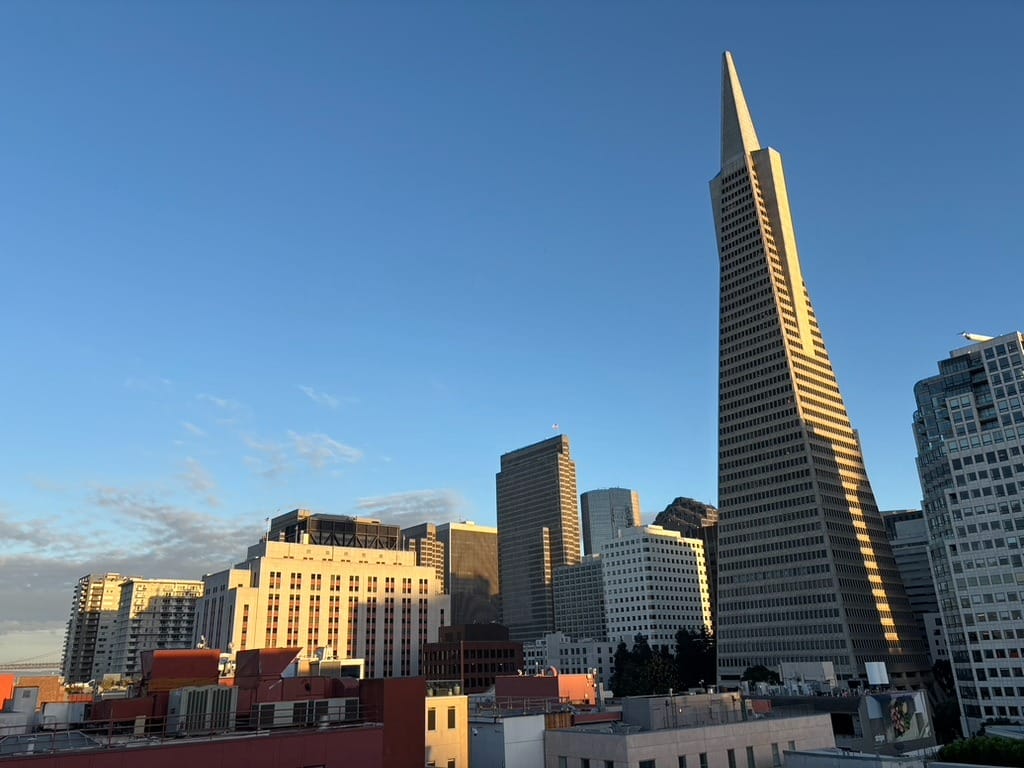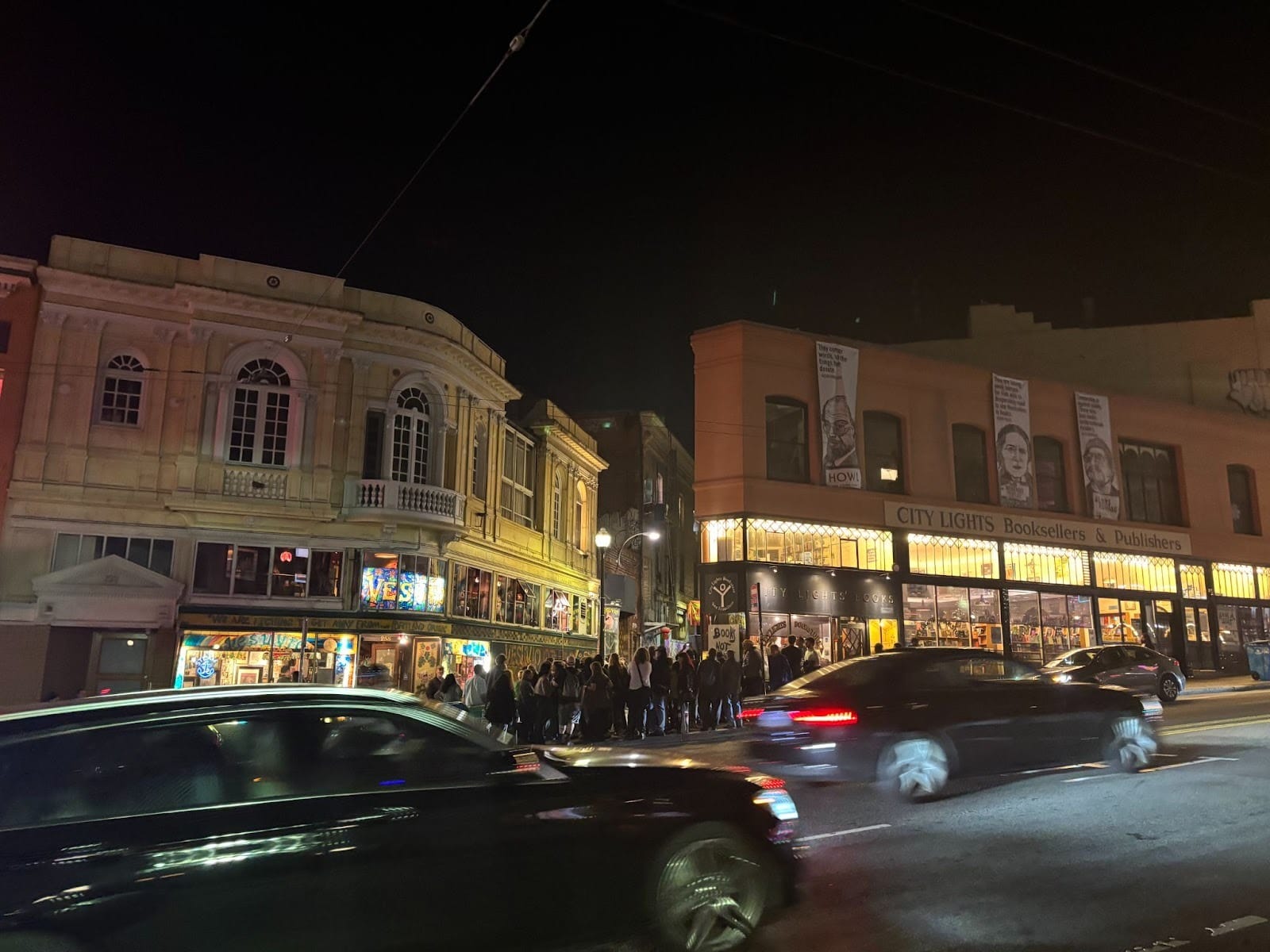For my third foray into the belly of the beast, I aimed high. It’s easy to get trapped in the cultural discourse surrounding tech, with all of its quirks and baffling social relations, but I didn’t want to obfuscate material concerns. I searched for the most industrial event I could find.
I landed on “AI Strikes Oil: American Dynamism in Energy,” advertised as “the only SF Tech Week event dedicated to the AI revolution reshaping America’s energy and industrial base.” I had fantasies of listening to a series of conversations that would knock me off my core and remind me of just how different the stakes of the world are to people invested in its lucrative demise. Most of the RSVPs were VCs and I wanted to know what types of discussion these people are having amongst each other, not realizing other people might hear them. In other words, I wanted a bite-sized glimpse into the reproduction of power.
Once I arrived, though, it became clear that such a glimpse would not come easy.
The event took place at CANOPY in Jackson Square (though can you really still call it Jackson Square if it’s one block south of City Lights? Are we not in North Beach at this point?). It’s a co-working space, and I’ve been around the block with co-working spaces and the discourse thereof (I worked at The Wing in New York pre-Covid!). But CANOPY is on a whole other level: Unlimited hotdesking sets you back $700/month, all the furniture is Herman Miller, and the private offices have law firm names on the doors. Arriving there contributed to a feeling I’ve had that, at its simplest, Tech Week is just how you get inside buildings in San Francisco that you might not otherwise have any means to access.
An elevator attendant had to use a keycard to get me to the right floor. When I noticed there was a separate tech week event on a different CANOPY floor, and everyone else in the elevator was heading there, I had a slight panic: had I picked the less-interesting option for the night? When I got off, a suited-up man at the check-in table asked me: “What company?” I told him I was unaffiliated. I had to repeat myself, because he didn’t understand. I told him my name and said I was on the RSVP list. He flipped through the print-out list in front of him without really scouring it, and then decided to just let me take a nametag. The options on the table already had “Investor” or “Entrepreneur” written on them; I wrote “Annie” on mine.
Past the check-in, inside the “co-working” area, a group of maybe 20 people were standing around networking, drinks in hand and names of scary-sounding companies on their nametags. I felt like a child who accidentally walked into her parents’ cocktail hour. I tried to remain unfazed. I grabbed a free beer and ate a couple crackers. But I felt too much anxiety at the prospect of actually talking to anyone; I had begun panicking about being found out or that any attempt at conversation would lead the check-in guy to show me the door. I started running through all the protections actual journalism affords you, the legible container of participation, but then again, I was not doing journalism. On and off the record don’t exist in the world of vibe reports, and that suddenly felt like something I needed to worry about. All week I had been thinking to myself: these events are just happening in public, not behind closed doors, and everyone is all too confident in their security, in the ability to freely convene without fear of disruption or sabotage. A little bit of time in this event reminded me of why. Absent a coordinated effort to oppose whatever dealmaking and speculation about future lost livelihoods is happening throughout San Francisco, class domination and exclusivity is enough to maintain a sheen of indestructibility.
This is a long way of saying I caved. I left before the panel started, went to the other event, ate a slice of Papa John’s pizza on a balcony with an incredible view (JewBelong billboard notwithstanding), and sat through a boring conversation about localization for products trying to scale across borders.

This ended up being, yet again, a conversation about AI. I heard an AI translation expert from Uber compare AI to the advent of home appliances: When dishwashers and washing machines were invented, “no mom said you’re taking the job of being a mom away from me,” he said; “She was happy, she got to spend more time helping her kids.” So true, domestic labor ended with the 1950s! Mostly, though, the conversation revolved around practical use cases for how AI can facilitate product adaptation to local markets. As one panelist described AI as a paradigm shift that would end human labor in his area of expertise, with a 5-7 year sunset, the crowd of young, competent professionals and confident panelists made it easy to feel that something relatively mundane was underway. Cue AI as normal technology discourse.
On the way out, a “late-stage founder” and an enterprise something or another exchanged information with me, commenting on how unexpectedly slow the elevator was. I regretted my anxious abandonment of the initial event, and walked my way up Columbus in search of more food. I could hear some very loud music and it occurred to me that a punk show was happening in Kerouac Alley. A throng of people filled the alley and the sidewalk in front of City Lights and Vesuvio. I ducked into Tosca Cafe. The vibes were slightly off–only one server was on the floor and the only other guests were large parties of what seemed like groups of colleagues–but it brought me back into the register of the everyday. Or rather, I left one Bay Area bubble and dropped back into my usual one.—Annie Lloyd

